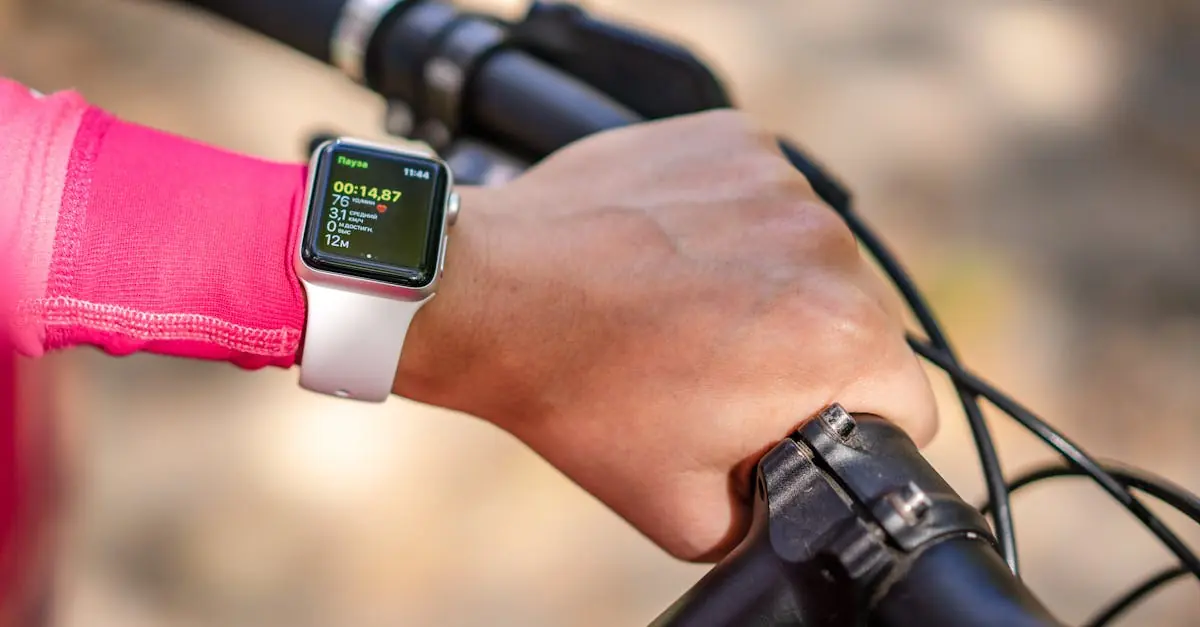In a world where counting sheep just isn’t cutting it anymore, sleep tracking apps have burst onto the scene like a caffeinated squirrel. These digital sleep assistants promise to transform your nightly slumber into a data-driven masterpiece, helping you uncover the mysteries of your snoozing habits. Ever wondered if you really do snore like a chainsaw or if that midnight snack is sabotaging your dreams?
Table of Contents
ToggleOverview of Sleep Tracking Apps
Sleep tracking apps monitor and analyze sleep patterns, helping users improve their rest. These digital solutions provide valuable data on sleep duration, disruptions, and quality. By understanding specific sleep stages, users can identify trends and factors affecting their slumber.
Different features enhance app functionality. For example, some apps utilize sensors to capture movement, while others measure sound to track snoring patterns. Users can access statistics on sleep quality, average sleep times, and overall trends through guided insights. Many apps also allow customization, letting users set sleep goals and receive tailored tips.
Reports showcase how sleep stages, such as REM and deep sleep, relate to overall health. Analyzing these stages aids users in making informed changes to their nighttime routines. Some apps even integrate with wearable devices, providing real-time data for more accurate monitoring.
User-friendly interfaces promote engagement. Intuitive designs allow for seamless navigation and quick data interpretation. Notifications help individuals stay accountable to their sleep goals, alerting them when it’s time to wind down.
Sleep tracking apps cater to various needs. Features range from basic tracking to advanced analytics suited for serious athletes or those with sleep disorders. The versatility of these technologies highlights their role in modern sleep science.
With growing interest in health and wellness, sleep tracking apps play a crucial part. As people prioritize sleep quality, these apps will continue evolving, enhancing their ability to support better sleep for users nationwide.
Key Features to Consider
When choosing a sleep tracking app, several important features impact usefulness and functionality. Users should evaluate these characteristics to find an app that truly enhances their sleep experience.
User Interface and Experience
A clear user interface enhances usability, allowing users to navigate effortlessly. Visual appeal plays a role in engagement; an intuitive layout encourages regular app usage. Customizable dashboards allow users to prioritize specific metrics, creating a personalized experience. Streamlined reporting can showcase trends, helping users easily visualize their sleep patterns.
Data Accuracy and Analysis
Precise data collection significantly affects the effectiveness of sleep tracking apps. Advanced algorithms process information to deliver accurate insights into sleep quality. Users benefit from detailed reports on sleep phases, such as REM and deep sleep. Regular updates improve data interpretation, ensuring users receive relevant and timely advice. By relying on trustworthy sources, apps can support users in making impactful changes.
Integration with Other Devices
Seamless integration with wearable devices enhances data collection for users. Many apps work with smartwatches and fitness bands to provide real-time monitoring. Connections to smart home devices can automate sleep environments, creating optimal conditions for rest. Users benefit from comprehensive health insights, consolidating data from various sources into one platform. This interoperability fosters a holistic approach to sleep improvement.
Popular Sleep Tracking Apps
A variety of sleep tracking apps stand out in the market, each offering unique features designed to enhance sleep quality. These apps cater to different user needs, providing insights into sleep patterns and personalized recommendations.
App 1: Overview and Features
Sleep Cycle offers an intelligent alarm clock that wakes users during the lightest sleep phase. It tracks sleep patterns using sound analysis and motion detection. Users receive detailed statistics on sleep quality, duration, and trends over time. Customizable wake-up windows allow for a gentler rise each morning. Furthermore, personalized sleep tips help users implement positive changes to improve slumber quality.
App 2: Overview and Features
Pillows combines advanced sleep tracking with an intuitive interface. This app captures sleep quality metrics and provides insights on various stages of sleep. Users benefit from a sleep diary feature that encourages personal reflections on sleep habits. Integration with Apple Health enables users to monitor overall wellness. Additionally, in-depth reports help users understand how lifestyle factors affect their sleep.
App 3: Overview and Features
Sleep Score employs a science-backed approach to sleep tracking. This app uses a combination of sensor and sound analysis to measure sleep performance objectively. Users gain access to a personalized score reflecting their sleep health. Detailed recommendations, based on sleep patterns, guide users toward better sleep habits. Integration with smart home devices enhances the sleep environment, ensuring optimal conditions for rest.
Benefits of Using Sleep Tracking Apps
Sleep tracking apps provide users with valuable insights into their nighttime habits. They monitor sleep duration and quality, enabling individuals to recognize patterns affecting rest. Analyzing specific sleep stages, such as REM and deep sleep, highlights areas for improvement in sleep hygiene. Data collected helps users make informed adjustments to their routines.
Enhanced awareness of sleep quality promotes healthier lifestyle choices. Users can identify potential disruptions, such as noise or uncomfortable sleeping positions. Discovering the impact of external factors, like late-night snacks, allows for more conscious decisions about pre-sleep behaviors.
Set personalized sleep goals with the aid of these apps. Tailored recommendations encourage users to establish beneficial routines that aid healthier sleep patterns. Engaging with built-in tips boosts accountability, making it easier to stick to objectives.
Integration with wearable devices further amplifies benefits. Real-time monitoring provides precise feedback on sleep quality and disruptions, delivering actionable insights. Certain apps also include features that analyze sleep trends over time, which enhances understanding of long-term habits.
User-friendly interfaces ensure ease of navigation, making it simpler for individuals to access their sleep data. Seamless integration with smart home technology improves sleep environments, allowing users to tailor settings for optimal rest. Overall, these tools empower users to take control of their sleep health, fostering habits that lead to improved well-being and productivity.
Limitations and Considerations
Sleep tracking apps come with certain limitations that users should keep in mind. Accuracy may vary across different applications, affecting the reliability of the data collected. Some apps rely on movement detection, which might not fully capture sleep quality as other metrics do. Users should consider the type of device used; smartphones may not track sleep stages as effectively as dedicated wearables.
Privacy concerns also arise when using sleep tracking apps. Data collection can lead to potential misuse of personal information, raising questions about how securely this data is stored and shared. Users must evaluate app privacy policies to ensure their data protection.
Furthermore, users may experience dependence on these apps, leading to increased anxiety about sleep performance. Monitoring sleep consistently could create stress rather than promote relaxation, affecting users’ overall sleep quality. A balanced approach is crucial when relying on these tools.
Compatibility issues might arise with some devices or operating systems, limiting functionality for specific users. Users should check device compatibility before choosing an app to avoid the frustration of inadequate features.
Lastly, sleep tracking apps do not replace professional medical advice. While these tools provide valuable insights, they cannot diagnose sleep disorders. Consulting healthcare professionals for persistent sleep issues remains essential for accurate assessments and treatments.
Sleep tracking apps are revolutionizing the way individuals approach their sleep health. By providing insights into sleeping patterns and offering personalized recommendations, these tools empower users to make informed decisions about their nighttime routines. As technology advances, the potential for enhanced features and better integration with wearable devices continues to grow.
While these apps offer valuable data, users should remain mindful of their limitations. It’s important to balance the information gained from these tools with professional medical advice when necessary. Ultimately, embracing sleep tracking apps can lead to improved sleep quality and overall well-being, making them a worthwhile addition to anyone’s health toolkit.





